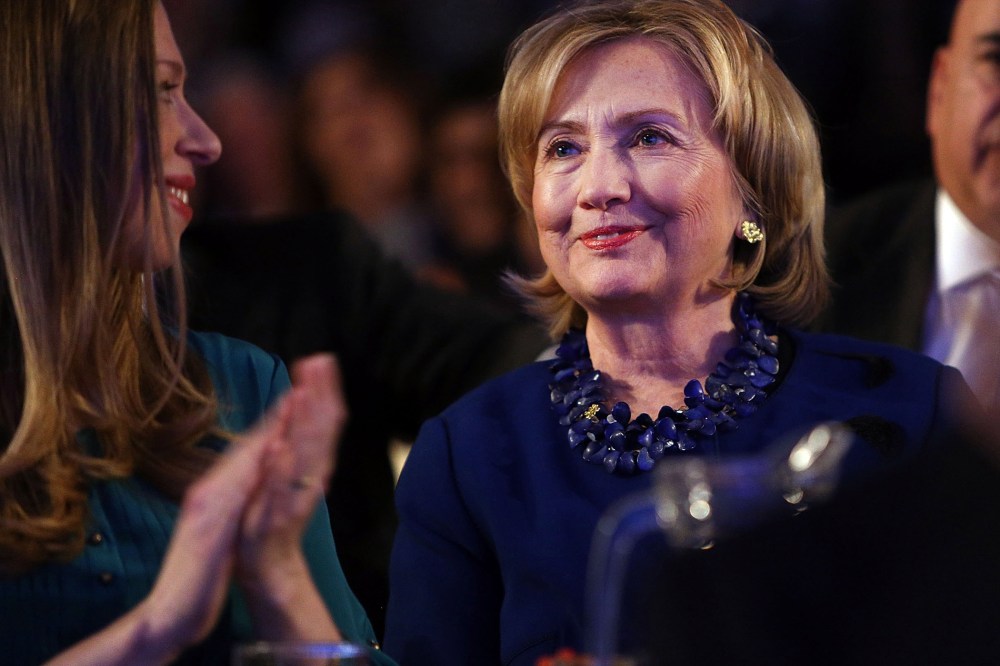Hillary Clinton will not clear the field.
Even as a cadre of the Democratic Party’s greatest minds and deepest wallets convene in a hotel ballroom in New York City to plot Clinton’s domination of the 2016 presidential nomination, a field of credible challengers is beginning to take shape.
The question is whether they will be the party’s next Dennis Kuciniches — idealistic, but ultimately doomed candidates — or Barack Obamas. So far, Clinton-backers don’t seem too nervous.
On Thursday, former senator Jim Webb became the first person to officially throw his hat in the ring when he announced an exploratory committee. The decorated Vietnam veteran with populist swagger and an anti-interventionist streak has already excited some progressives.
Related: Is Jim Webb 2016’s Barack Obama?
Like Obama, Webb would differentiate himself from Clinton on foreign policy, and especially the Iraq War, which he famously opposed. Unlike Obama, Webb would challenge Clinton from the political center, where some think Clinton is even more vulnerable than on her left.
Webb has yet to build a political infrastructure, apparently giving little heads up to allies about his impending announcement. Still, it was not a complete surprise. He’s made one trip each to Iowa and New Hampshire, and told reporters in recent months that he was seriously considering a bid.
On the other side of the ideological spectrum is Vermont Sen. Bernie Sanders, who is so liberal he’s not even a Democrat (yet), but an independent. Sanders has not made a final decision, but recently brought aboard top-flight Democratic strategist Tad Devine.
On Wednesday night, Sanders’ would-be campaign team huddled for several hours at a private home on Capitol Hill in Washington to go over the structure of the primary process and the feasibility of a run, a source familiar with the meeting told msnbc.
The group included Devine and business partner Mark Longabaugh, who ran then-Sen. Bill Bradley’s 2000 presidential campaign against Al Gore in New Hampshire, which could serve as a model for any insurgent run against Clinton. Several other strategists were present as well, including one involved in Obama’s 2008 bid.
“He’s looking at it very seriously, asking that all the questions that he needs to ask about a real campaign,” the source said of Sanders, who expects to make a decision “sooner rather than later.”
Sanders may struggle to be taken seriously by the mainstream press, but he starts with nearly $5 million in his political coffers and a national fundraising base that includes 750,000 campaign fundraising contacts.
Related: Hillary Clinton: GOP ‘abdication’ forced Obama’s hand on immigration
The senator insists he’s not interested in running a mere protest campaign, and those around him say he would only do it if he could mount a serious campaign. That means raising and spending at least $50 million in the early states, which would pay for television advertising, a full field operation in Iowa and New Hampshire, a more modest field presence in later states, a headquarters staff, and the resources to allow Sanders to travel and campaign.
Sanders has visited the early states several times already, and has another trip to Iowa planned for mid-December.
Despite major policy differences, supporters of both Webb and Sanders cast their candidates in some similar ways. Americans are sick and tired of politics as usual, both camps say, and are ready to embrace a nontraditional politician who will speak to their economic needs and anxiety.
Martin O’Malley, the third candidate not named Clinton almost certain to get into the race, would cast himself differently. O’Malley would tout his executive experience as both governor of Maryland and mayor of Baltimore, in contrast to the Senate careers of Clinton, Warner, and Sanders. And while the other three are in their late sixties or early seventies, O’Malley is almost two decades younger.
He worked harder than anyone to support fellow Democrats in key states in 2014, and recently hired a former Clinton adviser as policy director of his nascent presidential effort. While some Democrats blamed O’Malley for the defeat of his hand-picked replacement, Anthony Brown, those familiar with his thinking say he’s pressing ahead. “As he sees it, it doesn’t really change anything,” one source said.
So are any of these men capable of being the next Barack Obama?
Bill Burton, who witnessed Obama’s rise from inside as press secretary for the 2008 presidential campaign, isn’t convinced. “Even though President Obama was a new senator and serious underdog, he was still one of the most famous Democrats in the country when he announced in 2007. None of these other Democrats have that kind of profile or even the access to the kind of infrastructure he was able to build so quickly,” he said.
Indeed, while Clinton skeptics are often quick to point out that Obama blindsided Clinton, the then-senator’s rise was foreseeable in late 2006. At roughly this point in the 2008 presidential election cycle, Obama was already emerging as a clear threat. A CNN poll released in early November had the young senator trailing Clinton by just 11 points, and Pew dubbed him the “leading rival” to Clinton. Then-Sen. John Edwards was also attracting a sizable portion of the vote.
Clinton was a frontrunner then, but not the same way she is now. Current surveys consistently show Clinton leading by 50 percentage points or more. And the would-be candidate in second place, Vice President Joe Biden, is unlikely to run if Clinton does.
“The polls are overwhelming about what Democratic voters want, it’s not even close,” said former Pennsylvania Gov. Ed Rendell, who supporters Clinton. “No one is going to overcome that … It wasn’t like this last time.”











